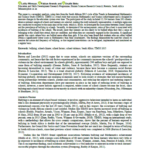Reducing bullying in schools by focusing on school climate and school socio-economic status

This paper is a secondary analysis, using data from the South African 2015 cycle of the Trends in International Mathematics and Science Study (TIMSS). TIMSS is a trend study that assesses Mathematics and Science achievement and is designed to measure changes in the education system over time. The participants of the study included 12,514 learners from 292 schools, where a national sample of schools and learners are selected, making the study nationally representative. A multiple regression was conducted to respond to the main aims of the study, which is, firstly, to investigate the association between school climate and the prevalence of bullying in schools. Secondly, to determine if the socioeconomic status of the school is associated with incidences of bullying at the school. The results show that learners are less likely to be bullied when they feel a sense of belonging to the school they attend, they are confident, and when they are constantly engaged in the classroom. A significant gender bias exists where boys are bullied more often than girls. It has also been found that students who are often bullied obtain a significantly lower score in Mathematics than their counterparts. The findings demonstrate the need for schools to monitor the nature and frequency of bullying, so that targeted interventions can be designed, implemented and monitored on a regular basis.
